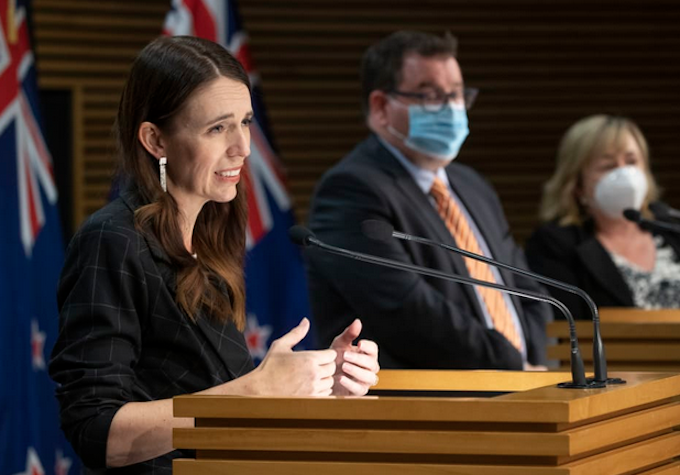
New Zealand Prime Minister Jacinda Ardern and Minister of Finance Grant Robertson used today’s post-cabinet briefing to discuss the shifting ownership of the national Kiwibank and flooding in the South Island districts of Nelson and Marlborough.
But they also faced questions over rogue Labour MP Dr Gaurav Sharma and planned protests tomorrow at Parliament.
Cabinet this week was expected to consider further support for flood-affected communities, including in Nelson and Marlborough after Ardern and Emergency Management Minister Kieran McAnulty examined the damage today.
Ardern said she was always mindful that visits to significant weather events — like those in Nelson — and natural disasters only gave a snapshot, often several days into the response and after some of the clean-up had begun.
“With all of that in mind there is no question that the rain in the region has been devastating. Homes have either become uninhabitable or they have large slips sitting precariously behind them,” she said.
The recovery would take some time, but she saw a very tight-knit community working hard to help out one another.
“Scones being brought to workers, the woman who delivered chocolates to the digger operators. I asked one woman if her home was okay. ‘Yeah, we’re absolutely fine,’ she said, ‘except for the car hanging above it.’
“It transpired that she couldn’t return home, but she seemed much more worried about everyone else, much more so than herself.”
Ardern said one of the biggest concerns in the Marlborough region at the moment was reconnecting those who had been cut off from the usual transport routes.
Watch the media conference
After discussion with McAnulty, the government will be kicking an initial $100,000 into the Marlborough relief fund, which was expected to be further extended.
The Nelson mayor had also requested a further $100,000, which took the Nelson fund to $300,000.
These funds were for immediate response, and were highly discretionary on the part of the mayors.
Ardern highlighted that they did not amount to the full recovery cost, and came separately to things like the funding for repairing roading, or support from the Ministry of Social Development.

Government taking control of Kiwibank
Ardern said it was both exciting and reassuring that the government had secured Kiwibank’s long-term future in New Zealand ownership, with the crown taking over from crown-owned NZ Post, Accident Compensation Corporation (ACC) and the NZ Superannuation Fund.
“Not only will this safeguard all future profits to stay in the country — unlike the Australian-owned banks — it will also continue to enhance competition in the banking sector,” she said.
“The government is fully committed to ensuring Kiwibank is supported to meet its full potential and that includes ensuring access to capital, so the bank can be a genuine and credible competitor … which operates independently of the government but that is able to compete on a level playing field with the big Aussie operators.”
Robertson said the move honoured the purpose and intent of Kiwibank when it was set up in 2002.
“This transaction has come about as the circumstances for the shareholders since 2016 — New Zealand Post, ACC and the New Zealand Super Fund, all crown-owned — their interests in Kiwibank have diverged … since this time.”
He said the acquisition would not change the overall value of the crown’s balance sheet, but owning shares in Kiwibank did not fit with NZ Post and ACC’s long-term plans, including NZ Post’s goal of growing its core delivery business, and ACC’s long-term investment strategy has evolved beyond owning shares in a bank.
NZ Super Fund was interested in a majority holding, but withdrew its interest as it did not align with the government’s ownership objectives.
New Zealand public ownership of the bank was a bottom line for the government, Robertson said, as it was for the previous National-led government.
“Kiwibank will continue to operate independently and at arm’s length from the government with the crown’s ownership of Kiwi Group Holdings through a newly incorporated schedule for a company, Kiwi Group Capital.”
Robertson said Kiwi Group Capital would be governed by a board of directors and the shares would be held by shareholding ministers as usual.
“At one level the acquisition is a straightforward transfer of assets … the government does have to fund this transaction and this will be through the government’s multi-year capital allowance.
“This means that the cost to purchase is already reflected in the borrowing programme we announced at Budget 2022 and has no impact on the crown’s overall debt forecasts.”
He said part of the transaction would include a special dividend payment to the crown, which was yet to be determined by the board.
Robertson rejected the suggestion the Kiwibank ownership model was changing because New Zealand Post was struggling with its business model.
“What this is, is making sure that a banking institution, that we think’s got a really important role in New Zealand, stays Kiwi-owned, and when the five-year exit limit came off last year we began discussions.”
The Super Fund had wanted a level of flexibility which would have allowed foreign ownership or final sale to foreign entities, “which we simply couldn’t do because our bottom line was to stay Kiwi-owned”.
He believed the bank remained an important part of New Zealand’s banking landscape.
Ardern said after 20 years of operation for Kiwibank, it was an exciting milestone.
Labour backbench MP Gaurav Sharma
Labour’s caucus will tomorrow consider expelling Hamilton West MP Dr Gaurav Sharma.
Ardern said there had been no basis to a lot of the claims that had been made by Dr Sharma, “and I think we do need to have thresholds before we launch into things like inquiries that of course come at considerable expense and of course stress and anxiety to the staff that have been drawn in”.
Dr Sharma provided a recording of someone he said was a senior MP in the caucus to Newshub, who called him after a meeting he was not invited to.
Ardern said she did not think the fact it was secretly recorded was appropriate and she did not intend to chase down details of who it was.
She said it was her personal belief the person who contacted Sharma was trying to help the situation.
A message from minister Kiri Allan, shared to the caucus, which Dr Sharma shared with media in a screenshot he claimed showed backbench MPs were being advised on how to avoid the Official Information Act, had been taken out of context, Ardern said.

“What you can see there is a minister who is concerned — as a decision-making minister, Minister of Conservation, remember … she needs to ensure that no one seeks to compromise that decision-making. It’s only appropriate to remind MPs that it wouldn’t be appropriate to lobby a decision-making minister.”
Ministers worked hard to ensure, where they did have decision-making powers, they treated those decisions very seriously, she said.
“We often can be judicially reviewed on the basis on which we make decisions, we do need to make sure that we undertake those decisions with due caution and it’s important to make sure colleagues know how seriously we take that as well.”
Responding to further questions about Sharma’s claim that MPs were being taught to avoid the OIA, Ardern said it was important that MPs had knowledge about how to handle information.
“A question was asked where an MP raised a situation where a constituent’s information was released in an OIA and was concerned about that … we find ourselves in a conversation where we’ve got a complete misrepresentation of the situation.”
She said whether or not Dr Sharma was expelled would be decided by caucus tomorrow.
The rules dictate that a member facing expulsion must be granted the right to attend and speak, “and of course we follow our rules closely”.
She said Sharma had, to date, not chosen to offer a defence to the caucus, nor had he taken up the offer of mediation.
This article is republished under a community partnership agreement with RNZ.











































